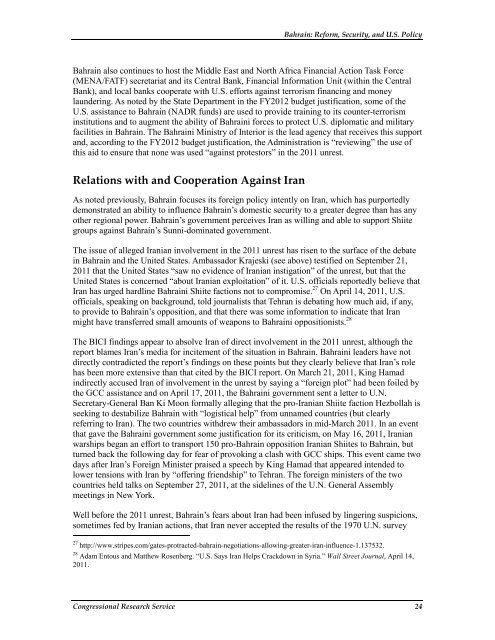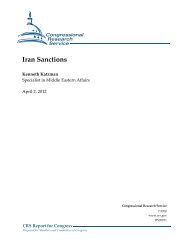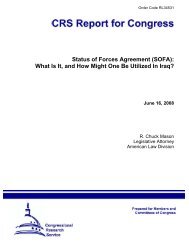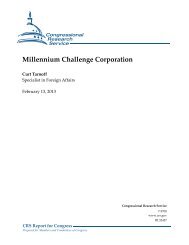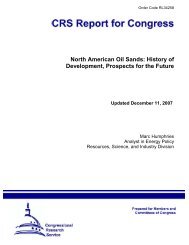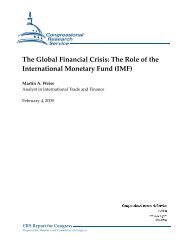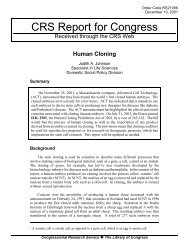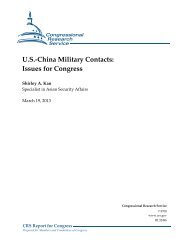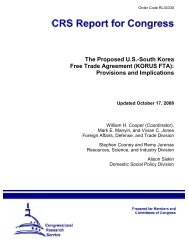Bahrain: Reform, Security, and U.S. Policy - Foreign Press Centers
Bahrain: Reform, Security, and U.S. Policy - Foreign Press Centers
Bahrain: Reform, Security, and U.S. Policy - Foreign Press Centers
Create successful ePaper yourself
Turn your PDF publications into a flip-book with our unique Google optimized e-Paper software.
<strong>Bahrain</strong>: <strong>Reform</strong>, <strong>Security</strong>, <strong>and</strong> U.S. <strong>Policy</strong><br />
<strong>Bahrain</strong> also continues to host the Middle East <strong>and</strong> North Africa Financial Action Task Force<br />
(MENA/FATF) secretariat <strong>and</strong> its Central Bank, Financial Information Unit (within the Central<br />
Bank), <strong>and</strong> local banks cooperate with U.S. efforts against terrorism financing <strong>and</strong> money<br />
laundering. As noted by the State Department in the FY2012 budget justification, some of the<br />
U.S. assistance to <strong>Bahrain</strong> (NADR funds) are used to provide training to its counter-terrorism<br />
institutions <strong>and</strong> to augment the ability of <strong>Bahrain</strong>i forces to protect U.S. diplomatic <strong>and</strong> military<br />
facilities in <strong>Bahrain</strong>. The <strong>Bahrain</strong>i Ministry of Interior is the lead agency that receives this support<br />
<strong>and</strong>, according to the FY2012 budget justification, the Administration is “reviewing” the use of<br />
this aid to ensure that none was used “against protestors” in the 2011 unrest.<br />
Relations with <strong>and</strong> Cooperation Against Iran<br />
As noted previously, <strong>Bahrain</strong> focuses its foreign policy intently on Iran, which has purportedly<br />
demonstrated an ability to influence <strong>Bahrain</strong>’s domestic security to a greater degree than has any<br />
other regional power. <strong>Bahrain</strong>’s government perceives Iran as willing <strong>and</strong> able to support Shiite<br />
groups against <strong>Bahrain</strong>’s Sunni-dominated government.<br />
The issue of alleged Iranian involvement in the 2011 unrest has risen to the surface of the debate<br />
in <strong>Bahrain</strong> <strong>and</strong> the United States. Ambassador Krajeski (see above) testified on September 21,<br />
2011 that the United States “saw no evidence of Iranian instigation” of the unrest, but that the<br />
United States is concerned “about Iranian exploitation” of it. U.S. officials reportedly believe that<br />
Iran has urged hardline <strong>Bahrain</strong>i Shiite factions not to compromise. 27 On April 14, 2011, U.S.<br />
officials, speaking on background, told journalists that Tehran is debating how much aid, if any,<br />
to provide to <strong>Bahrain</strong>’s opposition, <strong>and</strong> that there was some information to indicate that Iran<br />
might have transferred small amounts of weapons to <strong>Bahrain</strong>i oppositionists. 28<br />
The BICI findings appear to absolve Iran of direct involvement in the 2011 unrest, although the<br />
report blames Iran’s media for incitement of the situation in <strong>Bahrain</strong>. <strong>Bahrain</strong>i leaders have not<br />
directly contradicted the report’s findings on these points but they clearly believe that Iran’s role<br />
has been more extensive than that cited by the BICI report. On March 21, 2011, King Hamad<br />
indirectly accused Iran of involvement in the unrest by saying a “foreign plot” had been foiled by<br />
the GCC assistance <strong>and</strong> on April 17, 2011, the <strong>Bahrain</strong>i government sent a letter to U.N.<br />
Secretary-General Ban Ki Moon formally alleging that the pro-Iranian Shiite faction Hezbollah is<br />
seeking to destabilize <strong>Bahrain</strong> with “logistical help” from unnamed countries (but clearly<br />
referring to Iran). The two countries withdrew their ambassadors in mid-March 2011. In an event<br />
that gave the <strong>Bahrain</strong>i government some justification for its criticism, on May 16, 2011, Iranian<br />
warships began an effort to transport 150 pro-<strong>Bahrain</strong> opposition Iranian Shiites to <strong>Bahrain</strong>, but<br />
turned back the following day for fear of provoking a clash with GCC ships. This event came two<br />
days after Iran’s <strong>Foreign</strong> Minister praised a speech by King Hamad that appeared intended to<br />
lower tensions with Iran by “offering friendship” to Tehran. The foreign ministers of the two<br />
countries held talks on September 27, 2011, at the sidelines of the U.N. General Assembly<br />
meetings in New York.<br />
Well before the 2011 unrest, <strong>Bahrain</strong>’s fears about Iran had been infused by lingering suspicions,<br />
sometimes fed by Iranian actions, that Iran never accepted the results of the 1970 U.N. survey<br />
27 http://www.stripes.com/gates-protracted-bahrain-negotiations-allowing-greater-iran-influence-1.137532.<br />
28<br />
Adam Entous <strong>and</strong> Matthew Rosenberg. “U.S. Says Iran Helps Crackdown in Syria.” Wall Street Journal, April 14,<br />
2011.<br />
Congressional Research Service 24


